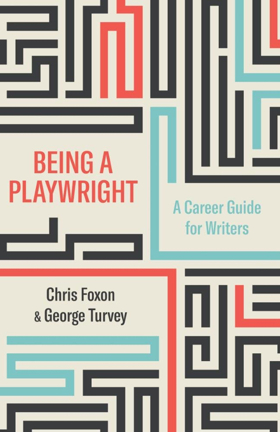Read An Extract From Chris Foxon and George Turvey's BEING A PLAYWRIGHT

Getting the best from feedback
An edited extract from Being a Playwright by Chris Foxon and George Turvey
What makes a script into a play is performing it in front of an audience. The response of your audience matters as much as that of professional reviewers, especially in an age of social media, which has levelled the critical field. This means that obtaining non-professional feedback on your script is valuable; you'll be hearing what your potential audience think.
Deciding who to approach for feedback and how to handle the process is not always easy. Here are some tips on how to get the best from feedback.
Do:
- Share your script with five or six friends. They should preferably have some theatregoing experience, so you can trust them to read with an understanding of the basic form, but not be heavily invested in the script. They should read with a fresh eye. You want a wide sample of responses, but not so many that you're bombarded; be selective. This is where enrolling on a training course or writers' group can be valuable.
- Encourage readers to be honest. Make it clear that you intend to redraft and are looking for constructive notes, not unquestioning emotional support.
- Be patient. Allow readers a few weeks to respond. If you hassle them, you may compromise the quality and effort that goes into their notes.
- Be open. Receiving notes is hard, but try not to be defensive; resist the urge to explain or debate individual points. Let your reader speak, without interruption, and focus on listening and absorbing. A Dictaphone to record their ideas may be useful, for further reflection. You could also ask the reader to email their thoughts in lieu of a face-to-face meeting.
- Allow readers to focus on the points that occur to them. Don't interrogate them or ask leading questions; that only curtails the ideas they may offer and precludes unexpected insights.
- Ask your readers to feedback individually, not en masse. You want to hear a range of opinions, not just those of the loudest person in the room. It's very easy for a dominant voice to overshadow or influence others.
- Ask your readers to express in a few sentences what they get from each scene. This will reveal any places where the story isn't coming across clearly.
- Know your own mind. Remember that when you ask people to read a script, they are under pressure to find something to say. Even professional readers often latch on to something just for the sake of justifying their input. So reflect carefully on all notes, don't accept them on principle.
- Be grateful for readers' time and effort, whether or not you intend to act on their notes. You want to build up a trusted cadre of informal readers you can return to, rather than huffily dismiss people who are only trying to help.
Don't:
- Give your readers an exhaustive synopsis of the play or your themes. They shouldn't be influenced by what you think it's about; they should judge what the script actually is. The field of literary criticism has long been aware of the 'intentional fallacy' (a memorable term coined by the even more brilliantly named Wimsatt and Beardsley); put simply, it means that an author's intentions are irrelevant in judging a text. Not just because a writer may have failed to execute their vision, but also because there may be virtues in the text of which an author is not consciously aware. You'll gain far more from hearing your readers' unadulterated personal responses than by priming them to address your preconceived ideas.
- Despair when readers comment negatively about aspects of the script. That's much more useful than generic praise. Don't be put off even if it sounds brutal. A professional reader will usually shape their criticism into constructive language, but an amateur may, with all goodwill, simply make a devastating statement. Train yourself to translate seemingly harsh criticism into constructive suggestion, so that 'it's utterly unbelievable that the character would do this' becomes 'it needs to be clearer why the character does this'. It may appear superficial, but when you are on the receiving end of a volley of notes, such delicacy can be vital to morale.
- Rush to make corrections or cuts based on one reader's feedback. You've shared the script with several people for a reason. Wait until you've heard the full range of thoughts, and assimilate these carefully, before picking up the red pen. One reader may give a note that reflects personal taste, or is simply a misreading; several readers concurring on a note mean it's probably worth acting on.
- Make piecemeal revisions. Working on particular issues separately will result in a patchwork script that may lose coherence; you may even be pulled to and fro by conflicting feedback. Wait until you have a complete list of notes and then address them all together, so that the play retains a clear structure and tone.
Being a Playwright: A Career Guide for Writers is published on 18 October, £12.99 paperback, by Nick Hern Books.
Chris Foxon and George Turvey are the team behind the multi-award-winning Papatango, one of the UK's leading new writing companies.
Play Broadway Games
Videos





%20(1024%20×%20512%20px).png)